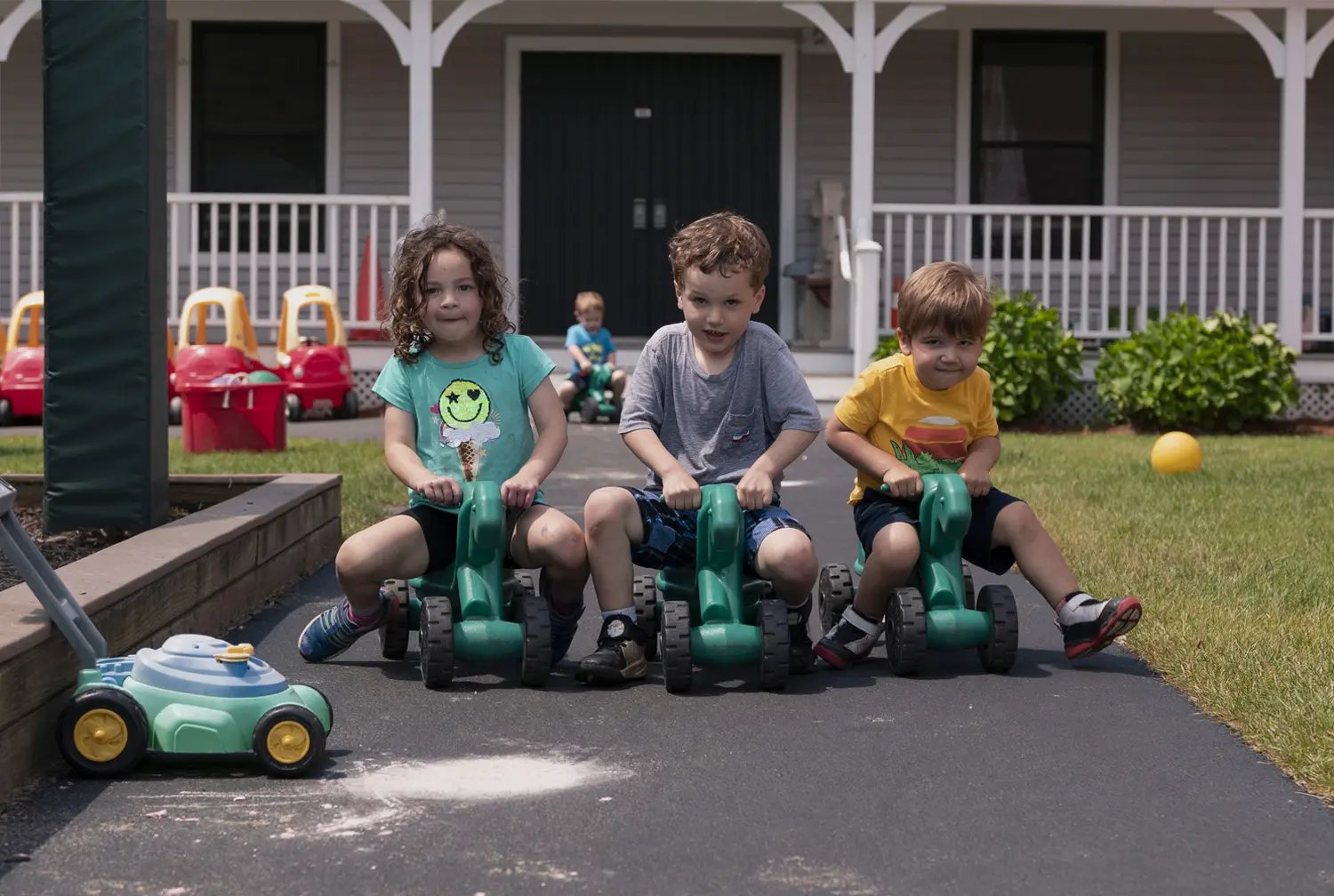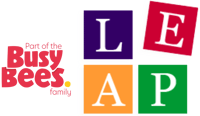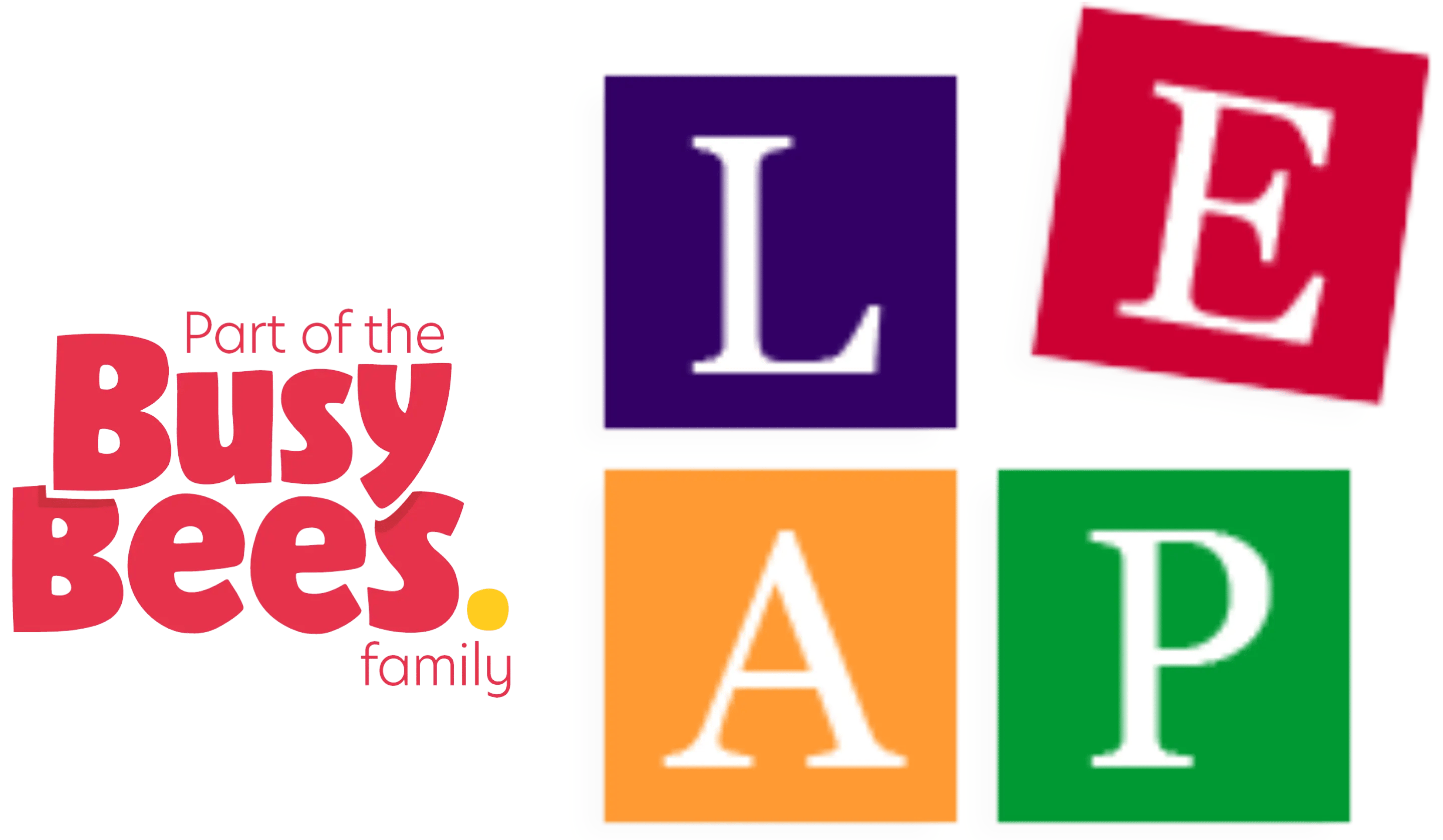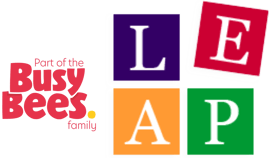
The LEAP Curriculum
Curriculum Matrix For Our Toddler, Preschool, & Transitional Kindergarten Programs in MA
The LEAP Curriculum Provides an Immersive Preschool Learning Experience Across a Wide Range of Educational Goals:
Young Toddler/Toddler Curriculum
Social/Emotional Skills
- Feels secure in relationships with others
- Displays pride in accomplishments
- Experiences and expresses a range of emotions
- Progresses in regulating his or her feelings and behavior
- Begins to learn ways to say goodbye to parents
Learning Skills
- Follows simple directions
- Persists with trial-and-error approaches to solve a problem
- Creates and carries out plan for solving simple problems
- Begins to understand that certain behaviors can cause results
Math
- Shows interest in matching and sorting
- Shows awareness of simple patterns
- Matches and sorts according to color, shape or size
- Recognizes and creates simple patterns
Science
- Experiments with various wet and dry materials to discover their properties
- Discovers living things found in nature
- Asks questions and develops inquiry skills
- Observes and identifies living things and begins to identify their basic needs
Imaginative Play Skills
- Actively participates in dramatizing familiar activities
- Begins to use pretend and dramatic play to act out familiar scenes
Literacy & Language
Verbal
- Demonstrates understanding of spoken (or signed) language
- Develops expressive language
- Engages in social communication
- Demonstrates phonological awareness
Reading
- Shows motivation to read
- Increases knowledge about books
- Recognizes familiar print
- Demonstrates knowledge that a symbol can represent something else
Writing
- Makes purposeful marks on paper
- Understands writing is a way of communicating
- Develops emergent writing skills
Group Skills
- Is exposed and encouraged to participate in short group activities
- Begins to recognize individual preferences and differences
- Begins to explore and become aware of the immediate community
- Notices similarities and differences in others
Physical Skills
- Develops large motor skills such as jumping, climbing up and down, throwing and hopping
- Is exposed to a variety of sensory materials to develop fine motor skills; including sand, water, shaving cream, and finger paints
- Coordinates eye and hand movements
- Controls small muscles in hand
Expressive Arts
- Is exposed to a variety of art media to develop fine motor skills; including paints, crayons, scissors and paper
- Responds to and participates in music, rhythm and songs
Lower Preschool Curriculum
Social/Emotional Skills
- Exhibit confidence in own abilities
- Able to express needs and feeling in an age appropriate way
- Form meaningful relationships with peers
- Show an interest in sharing toys and materials
- Works cooperatively with peers to complete a task
- Respond positively when conflict resolution skills are modeled by a teacher
Learning Skills
- Demonstrate interest in exploring
- Show curiosity and a desire to learn
- Use creativity and imagination
Math
- Participate in sorting, comparing, and describing activities
- Connect many kinds of concrete objects and actions to numbers
- Classify objects by similarities and differences
- Begin to recognize a sequence of events (beginning, middle, end)
- Use concrete objects to solve simple math problems (addition & subtraction) using comparative language (more than, less than, equal to)
Science
- Prediction about changes in materials or objects based on past experiences
- Manipulate a variety of familiar and unfamiliar objects to observe, describe, and compare their properties using appropriate language
- Use their sense of sight, hearing, touch, smell and taste to explore their environment using sensory vocabulary
- Experiment with the concept of balance
- Explore and identify simple machines through play
Imaginative Play Skills
- Assume a pretend role
- Pretend with props and objects
- Interact with other children in imaginative play
Literacy & Language
Verbal
- Generate questions and gathers information to answer their questions in various ways
- Makes up stories
- Engage actively in read-aloud activities
Writing
- Use writing tools for self-expression
- Begin to recognize own name
- Become aware of print and symbols in the classroom environment
- Listen to, recite, sing, and dramatize a variety of age-appropriate literature
- Develop familiarity with the forms of alphabet letters, print, and letter forms
- Use own words or illustrations to describe experiences, tell imaginative stories, or communicate information
- Makes increasingly representational drawings
- Uses emergent writing skills for many purposes
Reading
- Enjoy listening to stories and looking at books
- Able to listen to a story and respond to questions about it
- Demonstrate the ability to use a book (Director, page-turning)
Group Skills
- Able to participate in small group experiences (games, table activities, freeplay)Able to participate in large group experiences (circle, specialists, story time)
Physical Skills
- Demonstrates increasing gross motor control and coordination
- Demonstrates increased balance and agility
- Uses small muscles for self-help skills such as pouring and zipping
- Uses classroom materials, such as manipulatives and toys to develop hand grasp and flexibility, finger dexterity
Expressive Arts
- Uses creativity and imagination
- Express themselves freely through movements
- Play instruments using different beats, tempos, dynamics and interpretation
- Explore variety of materials of media to create two- and three-dimensional artwork
- Uses creativity and imagination to explore Theatre Arts, Movement & Dance, Music
Upper Preschool/Transitional Kindergarten Curriculum
Social/Emotional Skills
- To exhibit a positive attitude
- To demonstrate cooperation and prosocial behavior
Learning Skills
- Demonstrates an interest in exploring classroom materials
- Uses multiple strategies and planning skills to accomplish goals
- Shows curiosity and a desire to learn
- Uses creativity and imagination
Math
- Recognizes patterns and is able to repeat them
- Makes comparisons (more/less, large/small)
- Demonstrates appropriate number sense and counting skills
Science
- Record observations and share ideas through representations/drawings
- Compare and contrast natural materials using descriptive language
- Observe and describe predictable life cycles
- Observe and describe natural habits and basic needs of plants and animals
- Demonstrates an ability to predict cause and effect outcome
Imaginative Play Skills
- Interacts with other children in imaginative play
- Sustains imaginative play
Literacy & Language
Verbal
- Talks with other children during daily activities
- Participates in group discussions appropriately
- Engage actively in read-aloud activities by asking questions, offering ideas, predicting or retelling
- Makes up stories
- Generate questions and gather information to gains answers in various ways
Reading
- Recognizes letters in own name and most other letters in the alphabet
- Recognizes own name and other sight words
- Identifies rhyming words
- Listen to, recite, sing, and dramatize a variety of age-appropriate literature
- Develop familiarity with the forms of alphabet letters, awareness of print, and letter forms.
- Use emergent writing skills to make letters in many settings and for many purposes
- Use their own words or illustrations to describe their experiences, tell imaginative stories, or communicate information
- Listen to, identify, and manipulate language sounds to develop auditory discrimination and phonemic awareness.
Writing
- Makes increasingly representational drawings
- Imitates recognizable letters and numbers
- Demonstrates an interest in using writing for a purpose (making signs, sending letters)
- Use emergent writing skills to make letters for many purposes
- Listen to, identify, and manipulate language sounds to develop auditory discrimination and phonemic awareness.
- Writes own name
Group Skills
- Able to follow 2-3 step directions
- To become aware of schedules and routines:
- To demonstrate self-help skills
Physical Skills
- Throws and object in an intended direction
- Build upper body strength and stability to gain controlled movements of shoulders
- Strengthens hand grasp and flexibility
- Use hand-eye coordination, visual perception and tracking, and visual motor skills in play activities
Expressive Arts
- Use dramatic play, costumes and props to pretend to be someone else
- Use props to explore space and movement
- Experiment with the use of texture, shapes and forms, pattern and symmetry in artwork
- Uses creativity and imagination to explore Theatre Arts, Movement & Dance, Music



